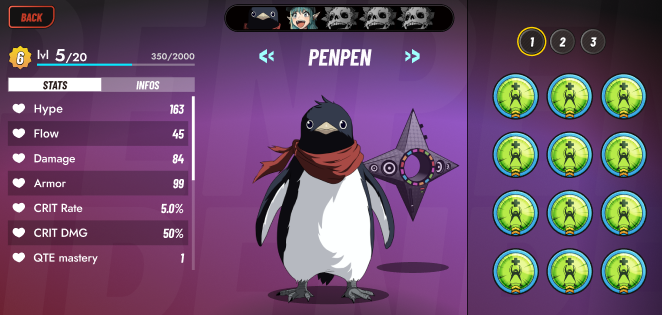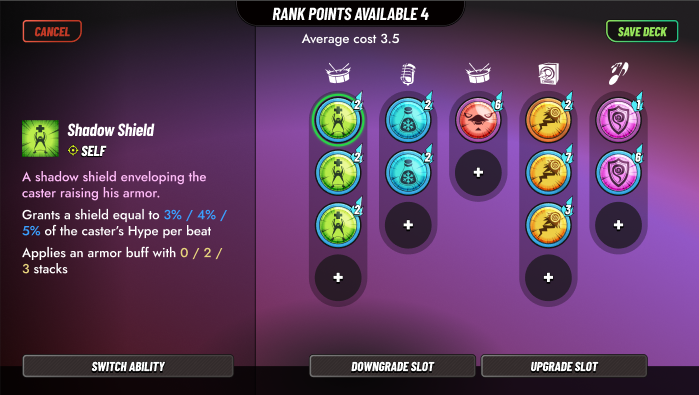Deck-Building Mode
In deck-building mode you craft up to three custom decks of skills and preview them before battle. This is where you fine-tune your character and steer part of their growth.

Five Categories
All skills fall into five distinct families—Drums, Chords, Melody, Voices and Bass. Each maps to a section of an orchestra on the musical side and to its own sub-system on the gameplay side.
The split lets us segment both effects (RPG layer) and samples (music layer). You’re not just optimising gameplay; you’re unknowingly composing a new track every match.
The secret: every single sample can be mixed with every other without ever sounding off-key—a tough musical constraint that guarantees your strategy will always produce a great-sounding tune.
🥁 Drums (Green) — Passive, cost = Flow
Percussion loops that run automatically bar after bar.
Possible effects: Heal · Buff/Debuff/Clean (Hype, Regen Hype, Drain Hype)

🎹 Chords (Blue) — Passive, cost = Hype
Harmonic backing that also loops automatically.
Effects: Flow Refill · Buff/Debuff/Clean (Flow, Regen Flow, Drain Flow)
Synergy: Drums keep you alive; Chords keep your mana flowing. Lose Hype and you’re KO; lose Flow and you can’t cast.

🎸 Bass (Purple) — Active, cost = Flow/Hype/Mixed
Plays only if equipped; once triggered it stays active until the end of the current 4-bar block.
Effects: Buff/Debuff (Armour, Resistance) · Shield · Clean (Armour, Resistance)

🎵 Melody (Yellow) — Active, main damage source
Cost = Hype, Flow or Mixed.
Effects: Direct Damage · Drain Hype/Flow · Buff/Debuff/Clean (% Crit, Crit Damage, Damage) · Heal
The only family that deals direct damage—pillar of offensive play.

🎤 Voices (Red) — Active, uber-flexible
Acts on any stat; cost = Hype, Flow or Mixed.
Effects: Buffs/Debuffs/Cleans (all stats) · Universal Clean (remove X stacks of every debuff)
Category recap
• Drums – passive percussion, Flow-paid → sustain / Hype management
• Chords – passive harmony, Hype-paid → Flow economy
• Bass – active defence, buffs & shields
• Melody – active offence, only direct-damage family
• Voices – active support, touches every stat

Building a Killer Deck

Rules
- A skill can only sit in its own category slot.
- Each character starts with 10 slots (2 per category).
- Star-level grants:
- Slot Points – unlock up to +2 extra slots in one category.
- Rank Points – raise a slot’s minimum rarity.
Can hold: Rare skills only
Effects available: Buffs & Debuffs
Can hold: Rare or Epic skills
Extra effects unlocked: Drain, Shield
Can hold: Rare, Epic or Legendary skills
Extra effects unlocked: Clean, Heal, Flow Refill
Players begin with simple effects and gradually unlock deeper options as the character advances.
Culture & Class – Your Gameplay DNA
A character is defined by two layers: Culture (origin) and Class (role).
- Culture grants a global stat preset.
Example: PenPen characters are hardy: +20 % Hype. - Class gives a second preset, a dominant category (-20 % cost in that family) and a unique passive.
Jasparu example
- Culture: PenPen → +20 % Hype
- Class: Monk → another Hype boost
- Dominant category: Bass (Bass skills cost -20 %)
- Class passive: All Monk shields reflect a % of incoming damage based on Armour.
That means Jasparu can win via pure defence—reflecting damage—without ever equipping a Melody card. Class steers your style but never locks you in.
Identity recap
• Culture = broad stat bonus
• Class = dominant category + stat tweak + unique passive
Signature Attacks & Maestria

Every character owns two special moves:
Both deal instant direct damage (sometimes extra effects) to keep battles short and explosive.
Musical Combo system
- One set of combos fills the Maestria gauge.
- Another set defines a power multiplier that boosts your Super/Ultimate when you fire it.
Execute clean musical patterns → charge up → unleash a crowd-pleasing finisher.

%20(1)%20(1)%20(1).png)




